高中英语语法---过去完成时
高中英语语法--现在完成时和过去完成时的区别

语法----现在完成时和过去完成时的区别1.从结构上区别现在完成时:主语 + have / has + 过去分词(肯定式)主语 + have / has + not + 过去分词(否定式)Have / Has + 主语 + 过去分词(疑问式)过去完成时:主语 + had + 过去分词(肯定式)主语 +had + not + 过去分词(否定式)Had + 主语 + 过去分词(疑问式)2.从时间状语区别现在完成时: 常用的时间状语包括“now, today, tonight, this week, this year, already, yet, just, recently…etc”。
过去完成时: 常用的时间状语包括“by, at, before等构成的短语”。
注意:当表示一段时间,现在完成时和过去完成时都可以用for 或since引导的状语。
例如:Have you had your lunch yet? 你吃午饭了吗?Yes, I have . I’ve just had it. 是的,我刚吃完。
I have had a clock now. 我现在有一个闹钟了。
Have you already posted the photos? 你把照片寄走了吗?The meeting had begun when we got there. 我们到那儿时,会议已经开始了。
We had learned about 5000English words by the end of last term.到上学期末我们已经学了5000个英语单词。
They had done the work at five o’clock. 在五点钟的时候他们已经完成了那项工作。
I’ve known Li Lei for three years. 我认识李蕾已经三年了。
I have worked here since ten years ago. 自从十年前我就在这工作。
高中英语语法归纳----过去完成时用法讲练
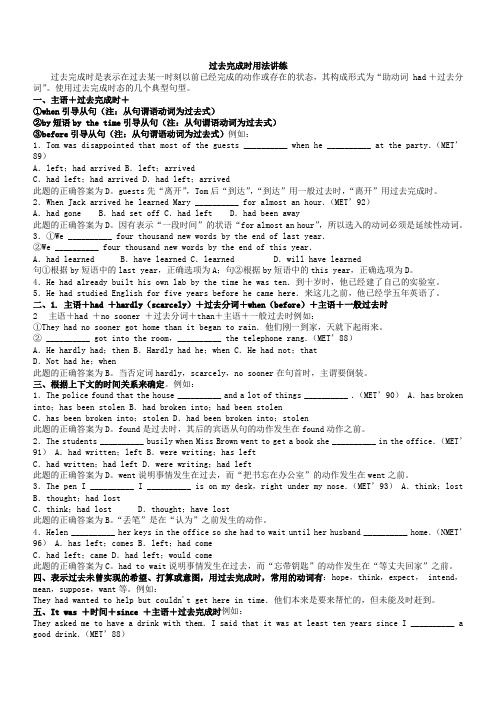
过去完成时用法讲练过去完成时是表示在过去某一时刻以前已经完成的动作或存在的状态,其构成形式为“助动词 had +过去分词”。
使用过去完成时态的几个典型句型。
一、主语+过去完成时+①when引导从句(注:从句谓语动词为过去式)②by短语by the time引导从句(注:从句谓语动词为过去式)③before引导从句(注:从句谓语动词为过去式)例如:1.Tom was disappointed that most of the guests __________ when he __________ at the party.(MET’89)A.left;had arrived B.left;arrivedC.had left;had arrived D.had left;arrived此题的正确答案为D。
guests先“离开”,Tom后“到达”,“到达”用一般过去时,“离开”用过去完成时。
2.When Jack arrived he learned Mary __________ for almost an hour.(MET’92)A.had gone B.had set off C.had left D.had been away此题的正确答案为D。
因有表示“一段时间”的状语“for almost an hour”,所以选入的动词必须是延续性动词。
3.①We __________ four thousand new words by the end of last year.②We __________ four thousand new words by the end of this year.A.had learned B.have learned C.learned D.will have learned句①根据by短语中的last year,正确选项为A;句②根据by短语中的this year,正确选项为D。
高中英语语法-过去完成时与练习题

高中英语语法过去完成时与练习题任何时态都是“时间”与“动作的意义”的结合。
过去完成时的时间很明显是“过去”;其动作的意义就是已经发生,换句话说就是完成了的情况。
结构过去完成时的基本结构是:“had + 动词的过去分词”。
例如:I had learned 2,000 English words by the end of last term. 到上学期期末为止我已经学了2,000个英语单词。
实质过去完成时表示在过去了的某个时间或动作之前所发生的动作,其实质就是“过去的过去”。
例如:When the teacher came into the classroom,Liu Hong had gone home. 当老师走进教室时,刘红已经回家了。
(“回家”发生在过去的动作“走进”之前)搭档1. “介词by +含一般过去时态的句子”。
介词by 本身表示“在……之前;到……为止”。
例如:Edison had built a chemistry lab by the time he was ten. 爱迪生十岁的时候就已经建立了一个化学实验室。
2. “时间状语从句”。
例如:When my mother got home,I had already done 10 maths problems. 当妈妈到家时,我已经做了十道数学题。
3. “宾语从句”或“间接引语”。
例如:The teacher asked if we had finished doing our homework. 老师问我们是否做完了作业。
He said that the had he visited the place twice. 他说这个地方他已经参观过两次了。
注意1. 和现在完成时不同,过去完成时有时也可以用在含有表示过去的时间状语的句子中。
例如:They told me that the letter had arrived on May 3rd. 他们告诉我信件五月三号就到了。
高中英语语法——时态
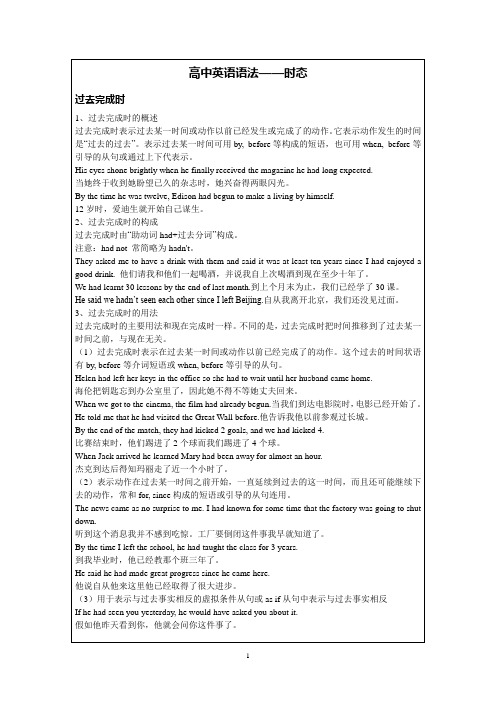
高中英语语法——时态过去完成时1、过去完成时的概述过去完成时表示过去某一时间或动作以前已经发生或完成了的动作。
它表示动作发生的时间是“过去的过去”。
表示过去某一时间可用by, before等构成的短语,也可用when, before等引导的从句或通过上下代表示。
His eyes shone brightly when he finally received the magazine he had long expected.当她终于收到她盼望已久的杂志时,她兴奋得两眼闪光。
By the time he was twelve, Edison had begun to make a living by himself.12岁时,爱迪生就开始自己谋生。
2、过去完成时的构成过去完成时由“助动词had+过去分词”构成。
注意:had not 常简略为hadn't。
They asked me to have a drink with them and said it was at least ten years since I had enjoyed a good drink. 他们请我和他们一起喝酒,并说我自上次喝酒到现在至少十年了。
We had learnt 30 lessons by the end of last month.到上个月末为止,我们已经学了30课。
He said we hadn’t seen each other since I left Beijing.自从我离开北京,我们还没见过面。
3、过去完成时的用法过去完成时的主要用法和现在完成时一样。
不同的是,过去完成时把时间推移到了过去某一时间之前,与现在无关。
(1)过去完成时表示在过去某一时间或动作以前已经完成了的动作。
这个过去的时间状语有by, before等介词短语或when, before等引导的从句。
Helen had left her keys in the office so she had to wait until her husband came home.海伦把钥匙忘到办公室里了,因此她不得不等她丈夫回来。
英语语法总结:过去完成时

英语语法总结:过去完成时过去完成时:1.构成:had + 过去分词2.功能:(1)表示过去某个动作或某个具体时间之前已经发生、完成的动作。
“过去的过去”。
►. They had got everything ready before I came.►. The play had begun before I got to the theater with my boyfriend.(2)过去完成时常用于hardly / scarcely ... when, no sooner ... than等固定句型结构中。
(此乃超级重点句型,意为:“一……就”)►. She had hardly / scarcely gone to bed when the bell rang.►. No sooner had he arrived at the railway station than he met her parents.(注意no sooner 在句首时句型倒装。
)(3)intend(打算),mean(意味),hope(希望),want(想要),plan(计划)等动词的过去完成时用来表示本打算做而没有做的事。
►. I had intended to call on you yesterday, but someone came to see me just when I was about to leave.(……原想昨天去看你……)►. They had planed to hold a football match last week, but they had to cancel it because the bad weather. (……原计划上周举行一场足球赛……)。
英语语法 过去完成时和过去完成进行时知识点比较
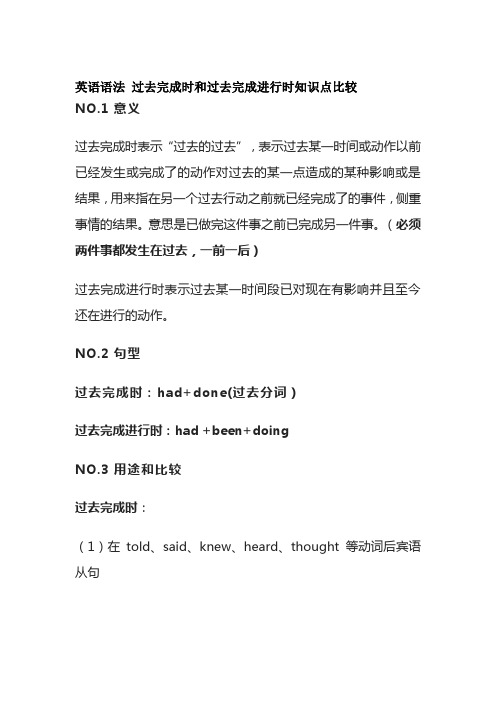
英语语法过去完成时和过去完成进行时知识点比较NO.1 意义过去完成时表示“过去的过去”,表示过去某一时间或动作以前已经发生或完成了的动作对过去的某一点造成的某种影响或是结果,用来指在另一个过去行动之前就已经完成了的事件,侧重事情的结果。
意思是已做完这件事之前已完成另一件事。
(必须两件事都发生在过去,一前一后)过去完成进行时表示过去某一时间段已对现在有影响并且至今还在进行的动作。
NO.2 句型过去完成时:had+done(过去分词)过去完成进行时:had +been+doingNO.3 用途和比较过去完成时:(1)在told、said、knew、heard、thought 等动词后宾语从句eg: She said that she had finished hishomework until her mum came back.她说她在她妈妈回来之前已经完成作业。
(2)作状语从句在过去不同时间段发生两个动作,发生在前,用过去完成时; 发生在后,用一般过去时。
eg: When I arrived, the train had left.当我到了,火车已经开了。
(3)表示意向,如“hope,wish,expect,think,intend,mean,suppose”等,用过去完成时表示“原本....,本能...."eg: We had hoped that you would come,but you didn't.我们希望你能来,但你没来(4)过去完成时的时间状语before,by, until,when, after, once, as soon aseg: He said that he had learned art before.他说他以前会学好艺术。
过去完成进行时:(1)表示到现在还尚未完成eg: He had been writing the novel.他还在写小说(2)企图eg: He had been studying English他仍在学习英语(3)未得结果eg: We had been studying what the teacher said.我们仍在学习老师教的知识(表示还没懂)(4)反复动作eg:He had been asking me the same question (很多次)他问过我很多相似的问题(5)情绪what had he been doing?(不耐烦)他在做什么?NO.4 理解过去完成时:句子中普遍存在过去式,两件事情都发生在过去,一前一后,强调结果过去完成进行时:时态少用,但经常强调事情对现在的影响。
高中英语时态过去完成时讲解

高中英语时态过去完成时讲解高中语法时态有16种,以下是CN人才网小编为大家提供的高中英语时态过去完成时讲解,欢迎阅读。
1. 过去完成时的定义过去完成时既可表示过去某个时间或动作之前所发生的事情(常用时间状语有already, before, ever, just, never, still, yet),也可表示过去某个时间或动作之前所发生的动作一直持续到过去某个时间(常接时间状语:since +时间点, for + 时间段)。
如:When I got to the station, the train had left. 当我到达车站时,火车已经开走了。
We had learnt fifteen lessons by last week. 到上周为止,我们学完了十五篇课文。
He had stayed here for two days before he left. 他走之前在这儿呆了两天。
He said that he had lived there since he was ten. 他说他十岁起就住在那儿了。
2. 过去完成时的结构过去完成时由“had + 过去分词”构成。
3. 过去完成时的应用(1) 与过去完成时连用的时间状语可以多种多样,使用它的主要依据是看其是否发生在“过去的过去”。
如:He had learnt some English before I went here. 在来这儿之前我学过一些英语。
He had written three stories by last year. 到去年他已经写了三篇故事。
We had cleaned the room when he got there. 当他到那儿时,我们已经把房子弄干净了。
He went there after he had finished his work. 他把事做完之后,就去哪儿了。
注意:当主句跟由before, after, as soon as所引导的时间从句的动作连接很紧密时,从句也可用一般过去时。
高中英语知识点归纳动词的过去完成时

高中英语知识点归纳动词的过去完成时动词的过去完成时是英语语法中的一个时态,用来表示过去某个时间点之前已经完成的动作或状态。
掌握动词的过去完成时的用法对于高中英语学习非常重要。
本文将对动词的过去完成时进行归纳总结,帮助读者更好地理解和运用该时态。
一、概述过去完成时的构成:had + 过去分词过去完成时的用法:表示过去某个时间点之前已经完成的动作或状态二、过去完成时的基本用法1. 表示过去某个时间点之前已经完成的动作。
例如:- By the time I arrived, they had already left.(我到达时,他们已经走了。
)- The train had left before I got to the station.(我到车站时,火车已经开走了。
)2. 表示过去某个时间点之前已经从事过的动作或经历过的状态。
例如:- She had studied French for five years before moving to Paris.(她在去巴黎之前已经学习了五年法语。
)- He had seen that movie three times before it was released.(在电影上映之前,他已经看了三次那部电影。
)三、过去完成时与其他时态的区别与联系1. 过去完成时与过去时的区别:- 过去完成时强调在过去某个时间点之前已经完成的动作或状态,过去时只表示过去的动作或状态。
- 过去完成时常常与表示过去某个时间点的时间状语连用,强调两个动作的先后关系。
2. 过去完成时与过去进行时的区别:- 过去完成时强调在过去某个时间点之前已经完成的动作或状态,过去进行时表示在过去某个时间点正在进行的动作。
- 过去完成时常常与表示过去某个时间点的时间状语连用,强调过去完成的动作发生在过去进行的动作之前。
3. 过去完成时与一般过去时的区别:- 过去完成时强调在过去某个时间点之前已经完成的动作或状态,一般过去时只表示过去的动作或状态。
过去完成时 高一语法
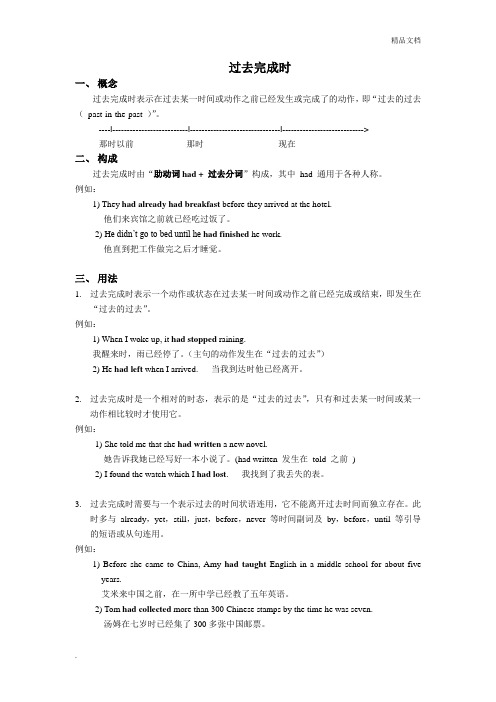
过去完成时一、概念过去完成时表示在过去某一时间或动作之前已经发生或完成了的动作,即“过去的过去(past-in-the-past )”。
----|--------------------------|-------------------------------|---------------------------->那时以前那时现在二、构成过去完成时由“助动词had + 过去分词”构成,其中had 通用于各种人称。
例如:1) They had already had breakfast before they arrived at the hotel.他们来宾馆之前就已经吃过饭了。
2) H e didn’t go to bed until he had finished he work.他直到把工作做完之后才睡觉。
三、用法1.过去完成时表示一个动作或状态在过去某一时间或动作之前已经完成或结束,即发生在“过去的过去”。
例如:1) When I woke up, it had stopped raining.我醒来时,雨已经停了。
(主句的动作发生在“过去的过去”)2) He had left when I arrived. 当我到达时他已经离开。
2.过去完成时是一个相对的时态,表示的是“过去的过去”,只有和过去某一时间或某一动作相比较时才使用它。
例如:1) She told me that she had written a new novel.她告诉我她已经写好一本小说了。
(had written 发生在told 之前)2) I found the watch which I had lost. 我找到了我丢失的表。
3.过去完成时需要与一个表示过去的时间状语连用,它不能离开过去时间而独立存在。
此时多与already,yet,still,just,before,never 等时间副词及by,before,until 等引导的短语或从句连用。
语法精讲---过去完成时
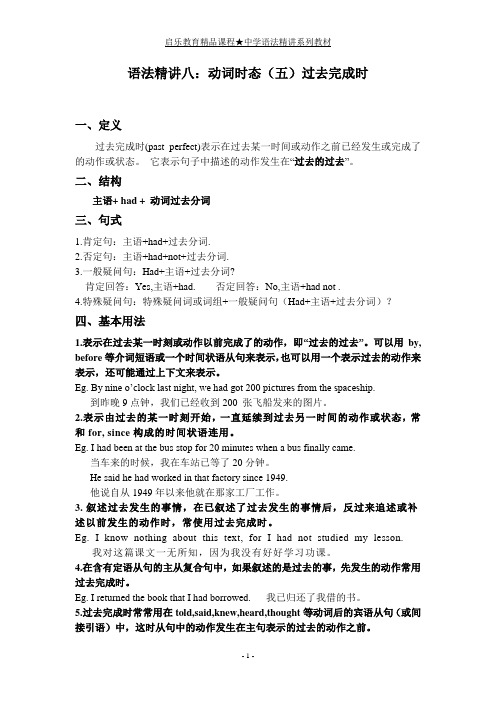
语法精讲八:动词时态(五)过去完成时一、定义过去完成时(past perfect)表示在过去某一时间或动作之前已经发生或完成了的动作或状态。
它表示句子中描述的动作发生在“过去的过去”。
二、结构主语+ had + 动词过去分词三、句式1.肯定句:主语+had+过去分词.2.否定句:主语+had+not+过去分词.3.一般疑问句:Had+主语+过去分词?肯定回答:Yes,主语+had. 否定回答:No,主语+had not .4.特殊疑问句:特殊疑问词或词组+一般疑问句(Had+主语+过去分词)?四、基本用法1.表示在过去某一时刻或动作以前完成了的动作,即“过去的过去”。
可以用by, before等介词短语或一个时间状语从句来表示,也可以用一个表示过去的动作来表示,还可能通过上下文来表示。
Eg. By nine o’clock last night, we had got 200 pictures from the spaceship.到昨晚9点钟,我们已经收到200 张飞船发来的图片。
2.表示由过去的某一时刻开始,一直延续到过去另一时间的动作或状态,常和for, since构成的时间状语连用。
Eg. I had been at the bus stop for 20 minutes when a bus finally came.当车来的时候,我在车站已等了20分钟。
He said he had worked in that factory since 1949.他说自从1949年以来他就在那家工厂工作。
3.叙述过去发生的事情,在已叙述了过去发生的事情后,反过来追述或补述以前发生的动作时,常使用过去完成时。
Eg. I know nothing about this text, for I had not studied my lesson.我对这篇课文一无所知,因为我没有好好学习功课。
4.在含有定语从句的主从复合句中,如果叙述的是过去的事,先发生的动作常用过去完成时。
高中英语语法八个时态归纳总结
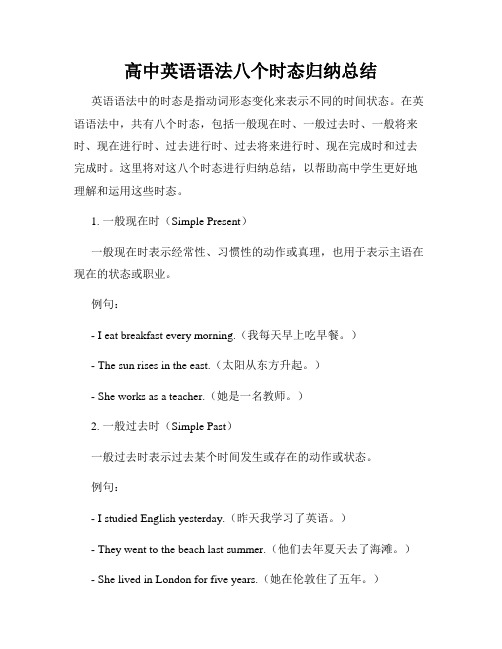
高中英语语法八个时态归纳总结英语语法中的时态是指动词形态变化来表示不同的时间状态。
在英语语法中,共有八个时态,包括一般现在时、一般过去时、一般将来时、现在进行时、过去进行时、过去将来进行时、现在完成时和过去完成时。
这里将对这八个时态进行归纳总结,以帮助高中学生更好地理解和运用这些时态。
1. 一般现在时(Simple Present)一般现在时表示经常性、习惯性的动作或真理,也用于表示主语在现在的状态或职业。
例句:- I eat breakfast every morning.(我每天早上吃早餐。
)- The sun rises in the east.(太阳从东方升起。
)- She works as a teacher.(她是一名教师。
)2. 一般过去时(Simple Past)一般过去时表示过去某个时间发生或存在的动作或状态。
例句:- I studied English yesterday.(昨天我学习了英语。
)- They went to the beach last summer.(他们去年夏天去了海滩。
)- She lived in London for five years.(她在伦敦住了五年。
)3. 一般将来时(Simple Future)一般将来时表示将来某个时间要发生的动作或存在的状态。
例句:- I will go shopping tomorrow.(我明天要去购物。
)- They are going to visit their grandparents next month.(他们下个月要去看望他们的祖父母。
)- She is going to study abroad after graduation.(她毕业后打算出国留学。
)4. 现在进行时(Present Continuous)现在进行时表示现在正在进行的动作或状态。
例句:- I am reading a book right now.(我现在正在读一本书。
高中英语语法过去完成时专题讲解

高中英语语法过去完成时专题讲解(一)过去完成时1.过去完成时:✈1).概念:过去发生或已经完成的动作对现在造成的影响或结果,或从过去已经开始,持续到现在的动作或状态。
✈2).时间状语:recently, lately, since…for…,in the past few years, etc.✈3).基本结构:have/has + done✈4).否定形式:have/has + not +done.✈5).一般疑问句:have或has提前概念:过去完成时表示在过去某一时间或动作之前已经发生或完成了的动作,即过去的过去(past-in-the-past ) ----|-------------------------- |-------------------------------|----------------------------> 那时以前 那时 现在 构成:过去完成时由"助动词had + 过去分词"构成,其中had 通用于各种人称。
They had already had breakfast before they arrived at the hotel.She had finished writing the composition by 10 :00 this morning.2、过去完成时的判断依据:由时间状语来判定✈ 1 )by + 过去的时间点。
Eg: I had finished reading the novel by nine o'clock last night.✈ 2 )by the end of + 过去的时间点。
Eg: We had learned over two thousand English words by the end of last term.✈ 3 )before + 过去的时间点。
Eg: They had planted six hundred trees before last Wednesday.3.课堂练习:一.用动词的适当形式填空1. We _____________ (paint) the house before we ______________ (move) in.2. That rich old man _____________ (make) a will before he _____________ (die).3. They _____________ (study) the map of the country before they ________ (leave).4. The robbers _____________ (run away ) before the policemen_______ (arrive).5. I __________ (turn off) all the lights before I ____________ (go) to bed.6. Paul __________ (go) out with Jane after he __________ (make) a phone call.7. Tom __________ (say) he ___________ (read) the book twice.8. Our plan ____________ (fail ) because we _____________ (make) a bad mistake.9. When the chairman ______________ (finish) speaking, he _____________ (leave)the hall.10.The Reads __ ______ (have) lunch when I ________________(get) to their house.二.句型转换1.I had sold the ticket when she came.(改否定句)2.She had sung a song to us before she danced.(改否定句)3.They began to climb the mountain after they had bought all the food and drinks.(否定)4.By 10:00 a.m, I had been very hungry. (改一般疑问)5.Lucy had already completed the project when I arrived.(改一般疑问)6.By the time he got to the airport, the plane had taken off. (改一般疑问)7..He had broken his arm when I saw him.(对划线部分提问)8.When he had read the note, he ate it. (对划线部分提问)9..Jack didn’t go to the cinema because he had seen the film. (对划线部分提问)10.We had had the toys for ten years before we gave them to the child. (对划线部分提问)Keys:一、1. had painted... moved 2. had made ... died 3. had studied…left4. had run away..arrived5. had turned off …went 6. went …had made 7. said …had read 8 failed …had made9. (had) finished …left 10. were having/had had …got二、1.I hadn't sold the ticket when she came.2. She hadn't sung a song to us before she danced.3. They didn't begin to climb the mountain after they had bought all the food and drinks.4. Had you been very hungry by 10:00 a.m?5. Had Lucy completed the project when I arrived yet?6. Had the plane taken off by the time he got to the airport?7. What had he done when you saw him?8.What did he do when he had read the note?9. Why didn't Jack go to the cinema?10. How long had you/we had the toys before you/we gave them to the child?(二)过去将来时:定义:它表示从过去某一时间来看将要发生的某个动作或存在的某种状态。
高中英语时态语法介绍
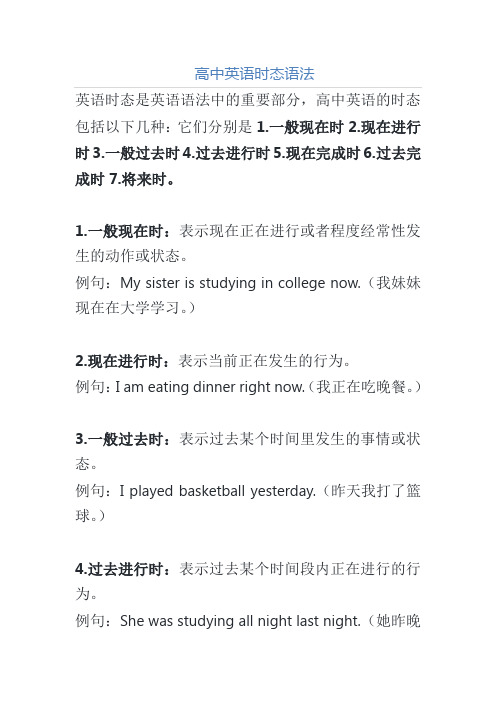
高中英语时态语法英语时态是英语语法中的重要部分,高中英语的时态包括以下几种:它们分别是1.一般现在时2.现在进行时3.一般过去时4.过去进行时5.现在完成时6.过去完成时7.将来时。
1.一般现在时:表示现在正在进行或者程度经常性发生的动作或状态。
例句:My sister is studying in college now.(我妹妹现在在大学学习。
)2.现在进行时:表示当前正在发生的行为。
例句:I am eating dinner right now.(我正在吃晚餐。
)3.一般过去时:表示过去某个时间里发生的事情或状态。
例句:I played basketball yesterday.(昨天我打了篮球。
)4.过去进行时:表示过去某个时间段内正在进行的行为。
例句:She was studying all night last night.(她昨晚一直在学习。
)5.现在完成时:表示从过去某个时间开始一直持续到现在的状态或者动作已经完成。
例句:I have lived in this city for five years.(我已经在这个城市住了五年了。
)6.过去完成时:表示在过去某个时间之前已经完成的动作或状态。
例句:He had finished his homework before he went to bed.(他睡觉前已经完成了作业。
)7.将来时:表示将来发生、实现的动作或状态。
例句:We will go on a trip next week.(我们下周去旅行。
)以上是高中英语时态的常见部分,熟练掌握并正确使用各个时态对于提高英语写作和表达水平非常重要。
过去完成时和过去将来完成时的区别
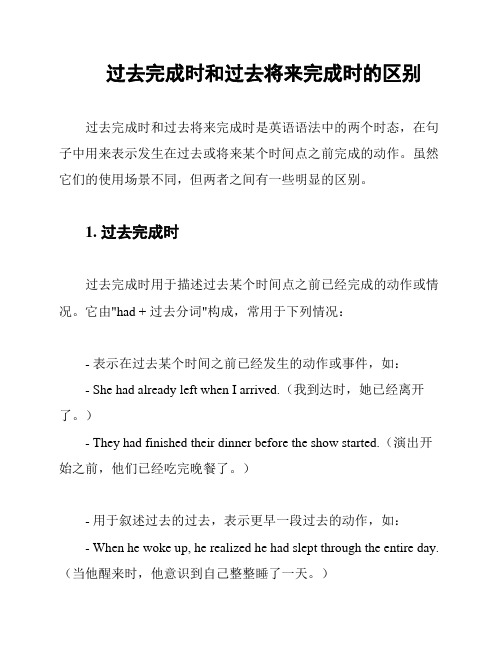
过去完成时和过去将来完成时的区别过去完成时和过去将来完成时是英语语法中的两个时态,在句子中用来表示发生在过去或将来某个时间点之前完成的动作。
虽然它们的使用场景不同,但两者之间有一些明显的区别。
1. 过去完成时过去完成时用于描述过去某个时间点之前已经完成的动作或情况。
它由"had + 过去分词"构成,常用于下列情况:- 表示在过去某个时间之前已经发生的动作或事件,如:- She had already left when I arrived.(我到达时,她已经离开了。
)- They had finished their dinner before the show started.(演出开始之前,他们已经吃完晚餐了。
)- 用于叙述过去的过去,表示更早一段过去的动作,如:- When he woke up, he realized he had slept through the entire day.(当他醒来时,他意识到自己整整睡了一天。
)- The teacher told us that the exam had already ended.(老师告诉我们考试已经结束了。
)2. 过去将来完成时过去将来完成时用于描述过去某个时间之前将要完成的动作或情况。
它由"would/should + have + 过去分词"构成,常用于下列情况:- 用于表示过去某个时间点之前已经计划或将要发生的动作,如:- He said he would have finished the report by the end of the week.(他说他将在本周末完成这个报告。
)- She promised she would have booked the tickets before the deadline.(她承诺在截止日期之前预订好了票。
)- 用于与过去的虚拟语气连用,表示过去某个时间点之前本应该完成但实际未完成的动作,如:- If I had known about the party, I would have brought a gift.(如果我知道有聚会,我会带礼物的。
- 1、下载文档前请自行甄别文档内容的完整性,平台不提供额外的编辑、内容补充、找答案等附加服务。
- 2、"仅部分预览"的文档,不可在线预览部分如存在完整性等问题,可反馈申请退款(可完整预览的文档不适用该条件!)。
- 3、如文档侵犯您的权益,请联系客服反馈,我们会尽快为您处理(人工客服工作时间:9:00-18:30)。
• 3. The bus_h_a_d__le_f_t__ (leave) by the time I got there.
• 4. By the time he_w_a_s__(be) 14, his grandfather had been
away.
had talked
• 5.It was the first time that he___c_a_ll_e_d__(talk) with foreigners.
till / until
1. 主句的谓语动词如果是延续性的应该用肯定式,意 为“一直到…”
2. 主句的谓语动词如果是瞬间性的应该用否定式,意 为“直到…才…”
1. I waited till/until 9 o’ clock. 2. The little boy cried till/until his father appeared. 3. I didn’t go to bed till/until 9 o’ clock. 4. Tom didn’t finish his homework till/until 9 o’ clock.
过去完成时标志词
before, after, when, by, hardly…when(刚要...就…) no sooner… than • by +过去:by the end of +last year, by the end of last term, by the time you arrived
It wasn’t until 11 o’ clock that he rned home.
before/since
当before放于主句之后,有时候会意为“就,才”
The man almost knocked me down before he saw me.
才
He rushed out of the room before I could say a word.
9:15
勇于开始,9才:3能5找到成
功的路
present
be on
arrive
Then I went to see the film with empty stomach.When I __a_r_r_iv_e_d____at the cinema, the film _h_a_d__b_e_en____(be)on for 20 minutes.
过去完成时表虚拟
• 过去完成时还可以表示对过去的虚拟,表示 未能实现的希望、愿望等, 常用的词有expect, hope, mean, suppose, think 等。
我本来想周末做完作业的,结果我朋友过生日。 I had wanted to finish my homework, but my friends had a birthday party.
When/While/As
When
when 意为‘这时’(at this time)或‘那时’(at that time) 时,常 用于下列句型:
Somebody was doing something when…… 某人正在做 ……突然 …… Somebody was about to do something when……. 某人正要做 ……突然 …… Somebody had just done something when…… 某人刚刚干了……这时……
我们刚要工作,天就下起雨来。
1.We had hardly begun our work when it began to rain. Hardly had we begun our work when it began to rain. We had no sooner begun our work than it began to rain. No sooner had we begun our work than it began to rain.
while 表示强烈的对比关系,可译成“然而”
e.g. She is tall while I am short. While I was studying English, he was playing football.
As
试观察: 1) As they were picking tea, the girls were singing happily.
It will be three days before I come back. 三天后我就回来了。
Since引导的从句的谓语动词是瞬间动词时,则从句表示的时 间是“从动作开始的那一刻起”
He has studies hard since he came to our school. 自从他来到我们学校,他学习就非常努力。
graduate
勇于开始,才能找到成 功的路
not see
After the film, I went to meet a friend whom I_h_a_v_e_n_o_t_s_e_e_n (not see) since we _g_r_a_d_u_a_t_e_d.
talk
steal 勇于开始,才能找到成
• It was three years since they had been together.
趁热打铁
• 1. By nine o'clock last night, we __h_a_d_g_o_t__ (get) 200 pictures from the spaceship.
• 2. I _h_a_d__b_e_e_n_ (am) at the bus stop for 20minutes when a bus finally arrived.
就
Before常用于这两个句型: It was/wasn’t+一段时间+before从句 过了多久/没过多久才 It will/won’t be+一段时间+before从句 还得过多久/用不了多久就
It was a long time before we met again. 过了很久我们才再次见面
came in .
While
观察: While they were doing homework, someone broke into the house. While he was still a teenager, he was a big star.
分析: while引导的从句表示“在……过程中”,强调某一段 时间内主句和从句的动作在同一时期发生。从句的动 作表示较长时间,因此常用延续性动词。
功的路
We had coffee and talked happily.But when I was
going to pay for it, I___fo_u_n_d____(find)my wallet
and cellphone _h_a_d__b_e_e_n_s_t_o_le_n_(steal).What an
特殊句式
1. It was the first time that + had done
• 那是他第一次到眉山。
• It was the first time that he had been to Meishan.
2. It was + 时间段+since+ had done
• 那时他们已经在一起三年了。
当not until放在句首时,主句要部分倒装。
Not until Mary had heard that sound did she really get frightened.
在强调句中,强调until引导时间状语时,常把not提前, 构成 it isn’t/wasn’t until… that
Future
A B Now
有两个动作都发生在过去, 先后发生, 先发生的用过去完成时, 后发生的用一般过去时。
过去的过去
Past
Future
A B Now
现在完成时:have/has+done
过去完成时: had +done had not +done had been done
找标志词
When the police arrived, the thieves had already run away. Before my Mom came in, I had already turned off my computer. After I had already turned off my computer, my Mom came in.
高中英语语法---过去完 成时
2020/9/25
神马是过去完成时?
•表示过去发生的一个动作之前已 经完成的动作,就是过去完成时 。
警察抓小偷
• 当警察赶到的时候,小偷早已经跑了。
When the police arrived, the thieves had already run away.
偷偷玩电脑
1. 他从学校回来时,他妈妈正在烧饭。 2. 他在看书时,他的妻子一直在烧饭。 3. 他一边烧饭一边唱歌。 4. 我们正要动身,这时天突然下雨了。 5. 你喜欢踢足球而我喜欢弹钢琴。 6. 随着时间的推移,我们都渐渐长大了。
Possible answers:
1. When he returned, his mother was cooking. 2. While he was reading, his wife was cooking. 3. As he cooked, he sang. 4. We were about to start when it began to rain. 5. you like playing football while I like playing the piano. 6. As time went by, we all grew up.
